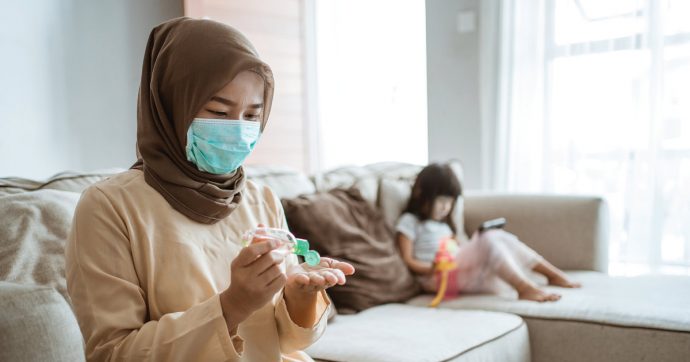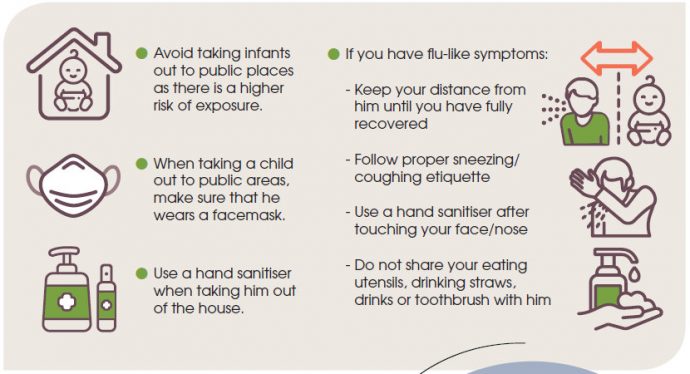Parents play a crucial role in helping to prevent the spread of infectious diseases, such as influenza, especially to their own infants and children.
This is because influenza easily spreads from one person to another, and statistics show that 1 in 4 infants or young children are hospitalised because of this disease. Influenza is also a greater threat than the common cold as it can cause serious complications.
Home exposure
Even if infants or young children stay at home without going out, they still face indirect exposure to influenza from their parents or other caregivers/visitors.
In the case of parents, they may be exposed to influenza when they go out to work, buy groceries, or for any social gathering. As parents usually have close contact with their children, this increases the risk of transmission; especially since they could be an asymptomatic carrier. What’s worse is that often influenza is also mistaken for the common cold as they both have similar symptoms such as fever, cough and runny nose.
One of the reasons why infants or young children tend to be more severely affected by influenza is because their immune system is still developing. Delays in getting treatment because it is mistaken for the common cold can also increase the risk of complications such as pneumonia, bronchitis, sinus and ear infections.
If your child has a chronic health condition (e.g. asthma, heart disease, diabetes, etc.) or is below 5 years of age, then he would also face a higher risk of developing complications.
What you can do to prevent influenza
There has been an unexpected positive outcome from the pandemic, with regards to influenza.
Because influenza is a type of respiratory infection, the recent COVID-19 prevention SOPs have been helpful in also limiting the spread of influenza. Coupled with the Movement Control Order that started in 2020, this has led to a drop in the number of reported influenza cases in Malaysia.
As a quick recap, these are the preventive steps you should observe as they are useful in flu prevention:
- Avoid taking infants out to public places as there is a higher risk of exposure.
- When taking a child out to public areas, make sure that he wears a facemask.
- Use a hand sanitiser when taking him out of the house.
- If you have flu-like symptoms:
- Keep your distance from him until you have fully recovered
- Follow proper sneezing/coughing etiquette
- Use a hand sanitiser after touching your face/nose
- Do not share your eating utensils, drinking straws, drinks or toothbrush with him
While the COVID-19 SOPs and the measures described above can help minimise the risk of influenza to your child, your best option for prevention still lies with vaccination. In addition to vaccinating your child against influenza, do get yourself vaccinated every year too. Just as how the COVID-19 vaccination has been successful in reducing the number of cases (thus helping to control the pandemic), flu vaccination is also crucial for preventing flu outbreak.
![]()
Don’t leave it to chance
Most experts agree vaccination plays a crucial role in the prevention of childhood diseases. The American Academy of Pediatrics (AAP), US Advisory Committee on Immunisation Practices (ACIP), and even the Malaysian Paediatric Association (MPA) all advocate that young children (from 6 months and older) should be vaccinated against influenza every year.
As parents, you may not fall under the high-risk group but vaccination is still an important form of prevention. As the active influenza virus is different every year, you will need to be vaccinated every year for optimal protection. Remember, by protecting yourself, you are also protecting your child. Despite the cliché, prevention is the best cure!
By
Dr Husna Musa, Paediatrician and Lecturer
Dato’ Dr Musa Mohd Nordin, Consultant Paediatrician and Neonatologist
An educational contribution by Malaysian Paediatric Association.







Comments